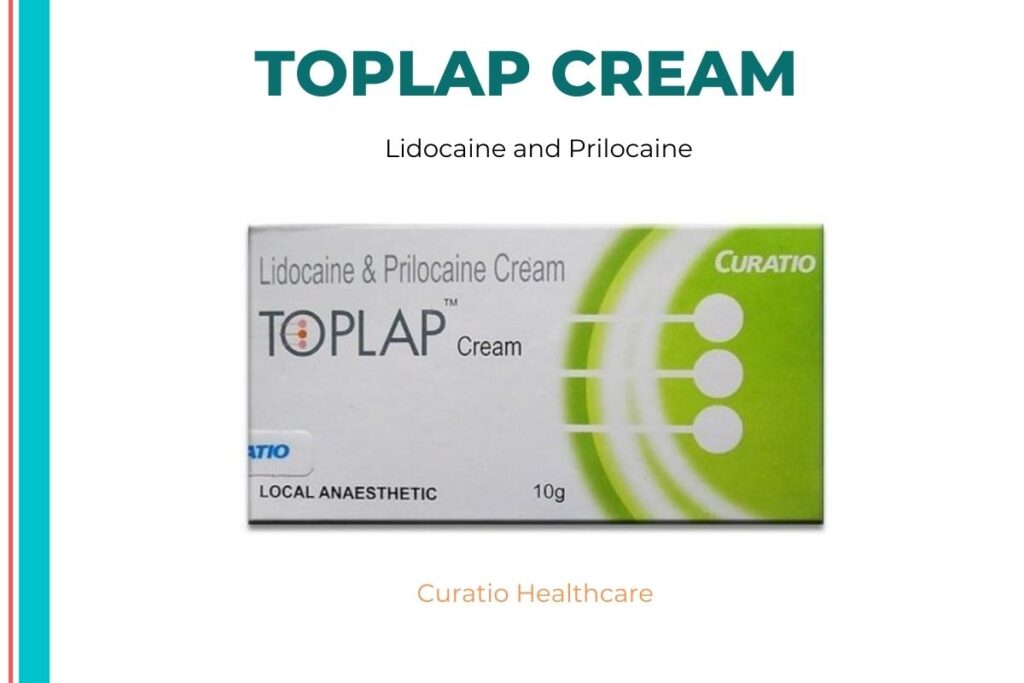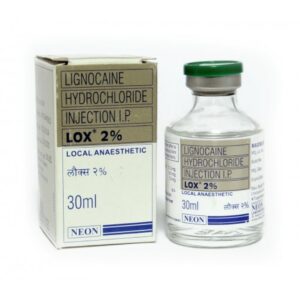Toplap Gel 15 gm
Toplap Gel 15 gm belongs to the ‘numbing medicine’ class of local anesthetics used to cause local numbness (anesthesia) on the skin prior to surgical procedures or injections. Pain is a symptom that is caused by the neurological system and generates unpleasant sensations in the body. Pain can be mild or severe, and it can be continuous or intermittent. The level of pain tolerance varies from person to person.
Toplap Gel 15 gm is a mixture of Lidocaine and Prilocaine, two amide-type local anesthetics. Toplap Gel 15 gm prevents impulse initiation and conduction by blocking the influx (entry) of sodium ions into the membrane that surrounds neurons. As a result, it has anesthetic properties and aids in pain reduction.
Toplap Gel 15 gm should only be used on normal skin and in the vaginal area. If your doctor tells you to, don’t use it on damaged, irritated skin or open wounds. Certain common side effects, such as responses at the application site, may occur in some situations (burning, itching, redness and irritation). The majority of these adverse effects do not necessitate medical treatment and will subside with time. However, if you are experiencing these adverse effects on a regular basis, you should consult your doctor.
Tell your doctor about your medical history before using Toplap Gel 15 gm, especially if you have broken skin/infection in the area where Toplap Gel 15 gm will be applied, heart disease, liver disease, or a specific blood issue (methemoglobinemia). If you plan to become pregnant, are pregnant, or are breastfeeding, tell your doctor before using Toplap Gel 15 gm. If Toplap Gel 10 mg gets into your eyes, nose, mouth, rectum, or vaginal area, flush with water right away. Toplap Gel 15 gm should not be used on puffy skin or deep puncture wounds. Before using Toplap Gel 15 gm, tell your doctor about your medical history and medications to rule out any possible negative effects.
Toplap Gel 10 mg Pain Relief (during surgical procedure and injections)

Medicinal Advantages
Toplap Gel 15 gm is an amide-type local anesthetic that contains Lidocaine and Prilocaine. To generate local numbness, Toplap Gel 15 gm is utilized (anesthesia). It’s used to numb normal, undamaged skin or the outside vaginal area before surgical operations like needle insertion, skin grafts, or skin laser surgery to reduce pain. Toplap Gel 15 gm works by preventing nerve signals from being transmitted throughout the body, reducing pain sensations.
Cream: Toplap Gel 15 gm must be administered to undamaged skin prior to the surgical operation. Apply a little layer of cream or lotion to the afflicted regions of the skin with clean, dry hands. Toplap Gel 15 gm can alternatively be applied with a piece of clean cotton wool or a gauze swab. Gently massage the medicine into the skin until it is no longer visible. Before and after using Toplap Gel 10 mg, wash your hands well.
Store in a cool, dry location away from direct sunlight.
Toplap Gel 15 gm Side Effects
Itching \sRash
Mild burning at the application site
Skin color changes at the application place
Drug Recommendations
To numb the skin, use the recommended dose of Lidocaine and Prilocaine. Do not exceed the recommended dose or duration, and do not cover treated skin areas with a bandage without first consulting your doctor. If too much Lidocaine or Prilocaine is absorbed through the skin, it can induce fatal adverse effects such as irregular heartbeats, seizures (convulsions), unconsciousness, delayed breathing, or respiratory failure (breathing stops). If you are pregnant or breastfeeding, see your doctor before taking Lidocaine or Prilocaine; your doctor will only prescribe Lidocaine and Prilocaine if the benefits outweigh the dangers. Drowsiness is a side effect of Lidocaine and Prilocaine, so drive carefully. Alcohol should not be consumed while taking Lidocaine or Prilocaine since it may cause drowsiness. People with a blood condition, glucose-6-phosphate dehydrogenase (G6PD) deficiency, kidney or liver disorders should avoid Lidocaine and Prilocaine. Before using Lidocaine and Prilocaine, tell your doctor about your medical history and medications to rule out any potential side effects.
Interactions Between Drugs
Antimalarials (chloroquine, quinine), seizure medications (phenobarbital, phenytoin, primaquine), heart rhythm and blood pressure medications (amiodarone, dofetilide, dronedarone, mexiletine, sotalol, tocainide, nitroprusside, nitroglycerin, isosorbide), antibiotics, and heart rhythm and blood pressure medications (amiodarone, dofetilide, drone (nitrofurantoin).
Drug-Food Interaction: Avoid drinking alcohol while taking Lidocaine or Prilocaine because it may cause drowsiness.
Lidocaine and Prilocaine may interact with a blood condition, heart failure, liver difficulties, and renal failure.
Safety Suggestions
ALCOHOL
While using Lidocaine and Prilocaine, it is recommended that you avoid drinking alcohol. Increased sleepiness may be caused by alcohol, as well as Lidocaine and Prilocaine.
PREGNANCY
Pregnancy category B drugs include lidocaine and prilocaine. If a woman is pregnant, she should only take the drug if her doctor recommends it. If you have any concerns, please consult your doctor; your doctor will only prescribe Lidocaine and Prilocaine if the benefits outweigh the hazards.
BREAST FEEDING
Only with a doctor’s recommendation can Lidocaine and Prilocaine be used in breastfeeding moms.
DRIVING
If you feel drowsy after taking Lidocaine or Prilocaine, do not drive or operate heavy machinery.
LIVER
In patients with liver damage or disease, Lidocaine and Prilocaine should be administered with caution. It’s possible that you’ll need to modify your dosage. If you have any worries about this or if you have a liver problem, please visit your doctor.
KIDNEY
If prescribed by a doctor, Lidocaine and Prilocaine are safe for people with severe kidney disease. Please consult your physician and inform them of all of your liver issues.
No habit formation
Advice on Diet and Lifestyle
Maintain a healthy weight by engaging in low-strain workouts on a regular basis and consuming nutritious foods.
Get enough sleep to help reduce inflammation and swelling by resting your muscles.
Relax by meditating, reading a book, having a warm bath, or listening to relaxing music.
Antioxidant-rich foods include berries, spinach, kidney beans, dark chocolate, and so on.
Flavonoids are found in foods that aid to reduce inflammation. Soy, berries, broccoli, grapes, and green tea are among them.
Avoid smoking and consuming alcoholic beverages.
Recommendations
Avoid getting it in your eyes or on exposed wounds.
If you get blistering of the skin where the drug is applied, contact your doctor very once.
Additional Information: This item is non-refundable.
Concerns of Patients
Pain is a sign of the neurological system that causes unpleasant sensations in the body. Pain can be mild or severe, and it can be continuous or intermittent. The level of pain tolerance varies from person to person. Pain can be generalized (generalized body aches) or localized (particular body aches) (affecting a specific area of the body). Pain can be beneficial since it alerts us to the fact that something is wrong with our bodies, allowing us to diagnose the problem. Headaches, muscle strains, cramps, wounds, bone fractures, arthritis, and stomach aches are all typical causes of pain.
FAQs
Lidocaine and Prilocaine are both present in Toplap Gel 15 gm. Lidocaine and Prilocaine work together to suppress pain signals from the nerves to the brain. As a result, the sensation of pain is reduced.
Only cover the treated area of skin with bandages or dressings if your doctor advises you to do so, as your body may absorb more Lidocaine and Prilocaine if it is covered.
After the expiration date, do not use Lidocaine or Prilocaine. Expiry refers to the last day on which the drug’s complete effectiveness and safety are guaranteed by the manufacturer. Check the expiry date on Lidocaine and Prilocaine from time to time and properly dispose or return it to your pharmacist for proper disposal when it has expired.
Be cautious and make sure no injuries occur in the numb area, as you will not feel the pain, but it will still hurt the most once the Lidocaine and Prilocaine effects wear off.
Lidocaine and Prilocaine should be used with caution by those 65 and older, as instructed by their doctor, because the risk of side effects increases with age.





Leave a Reply
You must be logged in to post a comment.